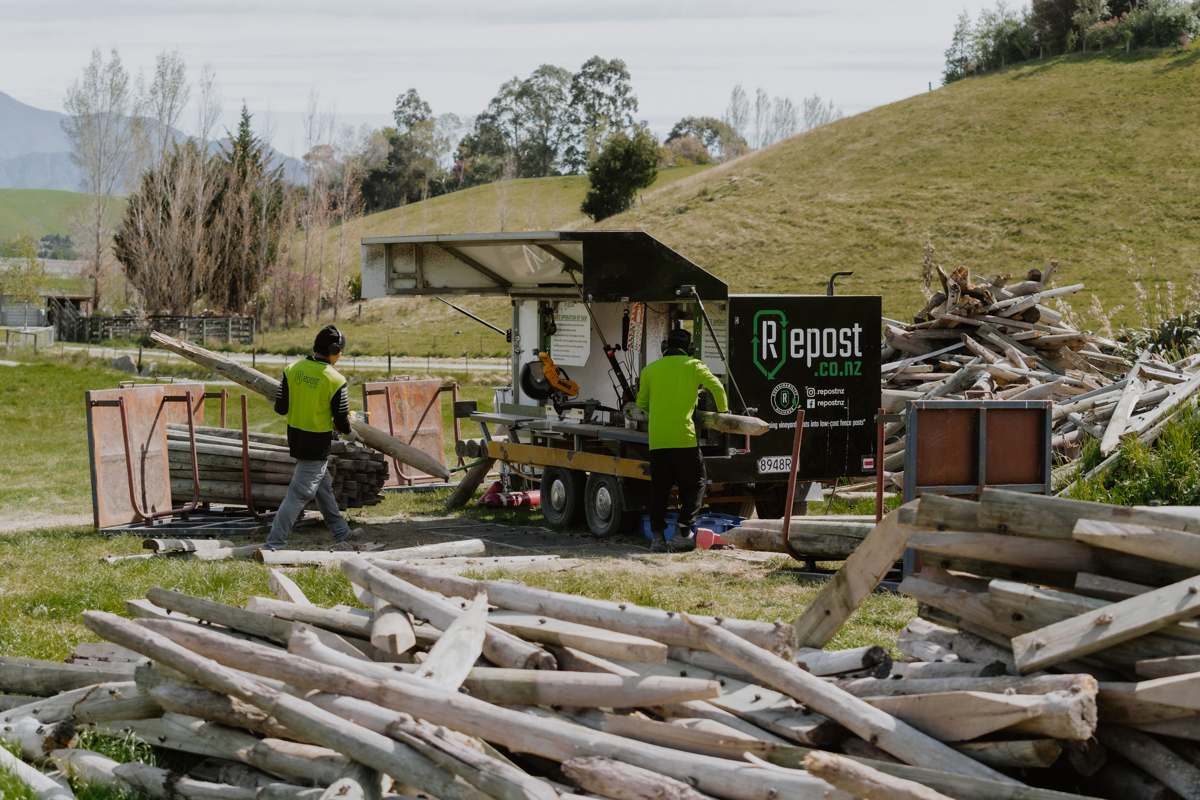Repost

Across Marlborough, hundreds of thousands of vineyard posts break each year, damaged during harvest, redevelopment, or day-to-day vineyard operations. These CCA chemically treated posts, made to last decades in the ground, are difficult to dispose of at end-of-life. Most are stockpiled, buried, or wrongfully burned. Until recently, there was no scalable, environmentally responsible solution to recover or reuse this material.
Repost, a Marlborough-based business founded by Dansy and Greg Coppell, is closing this loop.
By developing a commercially viable system to recover and repurpose broken vineyard posts, Repost is addressing one of the wine industry’s most persistent environmental challenges. The business transforms viticulture waste into durable, low-cost infrastructure for farmers, creating a circular model that links waste management with on-farm productivity.
The result is a system that reduces landfill, supports compliance, and demonstrates how regional innovation can deliver national sustainability outcomes.
From on-farm need to scalable mechanical innovation
Repost’s origin lies in a practical challenge. When Greg and Dansy Coppell purchased a sheep and beef farm in St Arnaud, they faced significant fencing requirements. The cost of new posts was prohibitive. They turned to broken vineyard posts as an alternative, structurally sound, but embedded with trellis hardware that made them frustrating and slow to repurpose.
This challenge sparked a new approach. Repost engineered a custom hydraulic nail puller to strip fittings without damaging the timber. What began as a one-off solution evolved into a full mechanical recovery system.
Through direct field testing and iterative design, Repost developed a mobile processing unit that could operate at vineyards, rural drop zones, or depot sites. Posts are stripped of trellis hardware, cut to standard sizes, sorted by condition, and prepared for resale. Full-length timber becomes fencing; shorter lengths are repurposed into battens an the system maximises yield, reduces handling costs, and keeps chemically treated timber in circulation giving it the lifespan it’s built for.
By transforming what was once a labour-intensive recovery process into a regionally scalable operation, Repost has built a working model for practical circularity in agriculture.
Building a full lifecycle trellis system
In early 2025, Repost expanded its solution from recovery to supply, by collaborating with Kaituna Mill to distribute MCA trellis square posts made from locally grown timber, treated with Micronised Copper Azole (MCA), a lower-toxicity, durable alternative to traditional CCA treatment. Each post is kiln-dried, carries a 50-year warranty, and locks away over 13kg of carbon. Designed for New Zealand vineyard conditions, the MCA range supports a full lifecycle approach to trellis infrastructure, from installation to end-of-life.
A key feature of this system is Repost’s trade-in recovery model. For every MCA post sold, Repost collects a used CCA post for recycling, free of charge. This eliminates disposal challenges for winegrowers, ensures material stays in circulation, and enables future sustainable disposal options such as biofuel conversion. By integrating product supply, waste recovery, and end-of-life management, Repost delivers a closed-loop model that supports grower compliance, sustainability reporting, and cost-effective infrastructure access, all while reinforcing the region’s commitment to zero-waste goals.

From regional solution to global relevance
Repost’s strategy is rooted in impact over scale, prioritising viable, adaptable infrastructure over rapid expansion. In doing so, the company is building a platform for regionally led circular infrastructure innovation with relevance far beyond Marlborough. This approach reflects a broader vision, one that values system change, industry connection, and long-term environmental outcomes over simple waste recovery.
Rooted in Marlborough, designed for national impact
Marlborough’s density of vineyard operations provided both the challenge and the proving ground. With 70% of New Zealand’s viticulture based in the region, Repost was able to test and scale a solution in an environment where the need was immediate and the opportunity tangible.
From here, Repost is demonstrating how locally developed, system-led innovation can address global sustainability challenges, repurposing waste into infrastructure, linking industries, and positioning rural New Zealand at the forefront of circular economy solutions.







